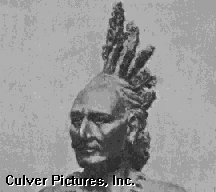
Setting
Meghan Lyman, Jennifer Robinson, and David Yoon

†
Boston during the 1640s, the setting of Nathaniel Hawthorneís The Scarlet Letter, was one of the destinations of religious reformers coming from England. Led by John Winthrop, these reformers wanted to purify the Church of England of all remnants of Catholicism.
Governor Winthrop

†
Theocracy
The Puritans focused on religious piety and devotion to the Word. Because of their strong religious beliefs, the Puritans established a government that was very much interwoven with their religion. Only church members were allowed to vote, creating a society absolutely controlled by Puritan leaders. In this society, civil obedience was synonymous with duty with God.
†
†
Sexuality
The Puritans viewed sexuality as an expression of manís animal nature which they could transcend through repression. This repression was accomplished through piety and faith in God. Sexual activity within marriage was accepted for purposes of reproduction, but sexual indulgences outside of marriage was considered a religious transgression.
†
Punishment
The Puritans harshly punished those who had beliefs which differed from theirs. Man was viewed as innately corrupt and punishment was used as a warning to keep others from straying from morality. The Puritans saw the growing immorality in New England as a sign that their society would either have to repent or experience "the cleansing fire of Godís wrath". Their severe punishment reflected the harsh environment that surrounded them. Punishment was a tool to create a civilized society in a savage world. Quakers were whipped; drunkards were marked with a "D"; adulteresses were marked with an "A"; and criminals were placed in stocks in the town square for public humiliation.
†
†

Relationships with Indians
Although the Puritans were intolerant of other religions, John Winthrop required that Indians be treated with respect. However, the purpose of the respectful attitude towards Indians was to convert them to Christianity. This, the Puritans believed, was Godís wish and would put them in His good graces.
†
Anonymity
The minimal size of developing towns, such as Boston where about one thousand Puritans lived, decreased anonymity among the townspeople. In these small towns, everyone was aware of crimes that were committed. Many times, punishment included public humiliation and ridicule which would have been less effective in a different, anonymous environment. In larger cities, wrongdoers could sometimes be discreet and avoid public condemnation.
 Back to Main Page
Back to Main Page
 To Next Page: Themes
To Next Page: Themes